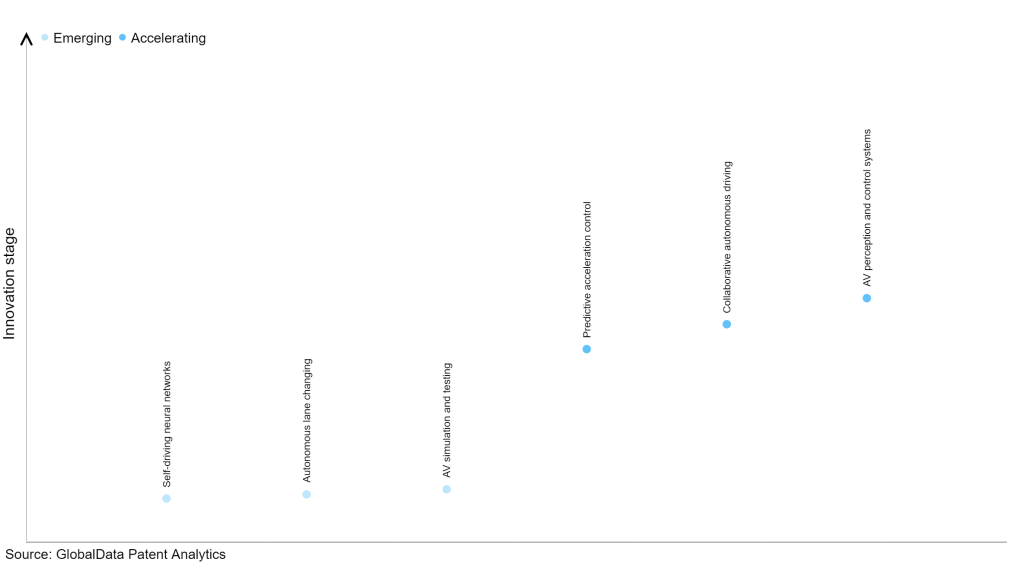The automotive industry continues to be a hotbed of patent innovation. Activity is driven by factors such as the growing demand for autonomous vehicles, the increasing complexity of autonomous vehicles, and the need for high-performance electronic control units (ECUs) to process large amounts of data. Apart from that, governments around the world are developing regulations to promote the development and deployment of autonomous vehicles. Innovation in the industy is also driven by growing importance of technologies such as sensors, artificial intelligence, high-performance computing, and vehicle-to-vehicle communications. In the last three years alone, there have been over 720,000 patents filed and granted in the automotive industry, according to GlobalData’s report on Artificial intelligence in automotive: autonomous vehicle ECUs. Buy the report here.
However, not all innovations are equal and nor do they follow a constant upward trend. Instead, their evolution takes the form of an S-shaped curve that reflects their typical lifecycle from early emergence to accelerating adoption, before finally stabilizing and reaching maturity.
Identifying where a particular innovation is on this journey, especially those that are in the emerging and accelerating stages, is essential for understanding their current level of adoption and the likely future trajectory and impact they will have.
300+ innovations will shape the automotive industry
According to GlobalData’s Technology Foresights, which plots the S-curve for the automotive industry using innovation intensity models built on over one million patents, there are 300+ innovation areas that will shape the future of the industry.
Within the emerging innovation stage, self-driving neural networks, autonomous lane changing and AV simulation and testing are disruptive technologies that are in the early stages of application and should be tracked closely. Predictive acceleration control, collaborative autonomous driving, and AV perception and control systems are some of the accelerating innovation areas, where adoption has been steadily increasing.
Innovation S-curve for artificial intelligence in the automotive industry

Autonomous vehicle ECUs is a key innovation area in artificial intelligence
An autonomous vehicle electronic control unit is a complex system of electronic hardware and software that manages the vehicle's operations and communicates between various vehicle components, such as the sensors, actuators, and the rest of the vehicle software. It is responsible for processing data from various sensors and generating commands for the vehicle's actuators to control its movements.
GlobalData’s analysis also uncovers the companies at the forefront of each innovation area and assesses the potential reach and impact of their patenting activity across different applications and geographies. According to GlobalData, there are 150+ companies, spanning technology vendors, established automotive companies, and up-and-coming start-ups engaged in the development and application of autonomous vehicle ECUs.
Key players in autonomous vehicle ECUs – a disruptive innovation in the automotive industry
‘Application diversity’ measures the number of applications identified for each patent. It broadly splits companies into either ‘niche’ or ‘diversified’ innovators.
‘Geographic reach’ refers to the number of countries each patent is registered in. It reflects the breadth of geographic application intended, ranging from ‘global’ to ‘local’.
Patent volumes related to autonomous vehicle ECUs
Source: GlobalData Patent Analytics
Alphabet is one of the leading patent filers in autonomous vehicle ECUs. Alphabet, the parent company of Google and Waymo, is at the forefront of developing autonomous vehicle ECUs. The company is focused on creating new ECU architectures that are more efficient and scalable than traditional ones, while also using new materials and manufacturing processes to develop more lightweight and durable ECUs. Some other key patent filers in the space include Baidu, Ford Motor, and Toyota Motor.
In terms of application diversity, Cox Enterprises leads the pack, while Mazda Motor and Kubota stood in the second and third positions, respectively. By means of geographic reach, Cox Enterprises held the top position, followed by Polaris and Alphabet.
To further understand the key themes and technologies disrupting the automotive industry, access GlobalData’s latest thematic research report on Artificial Intelligence (AI) in Automotive.
Data Insights
From

The gold standard of business intelligence.
Blending expert knowledge with cutting-edge technology, GlobalData’s unrivalled proprietary data will enable you to decode what’s happening in your market. You can make better informed decisions and gain a future-proof advantage over your competitors.



